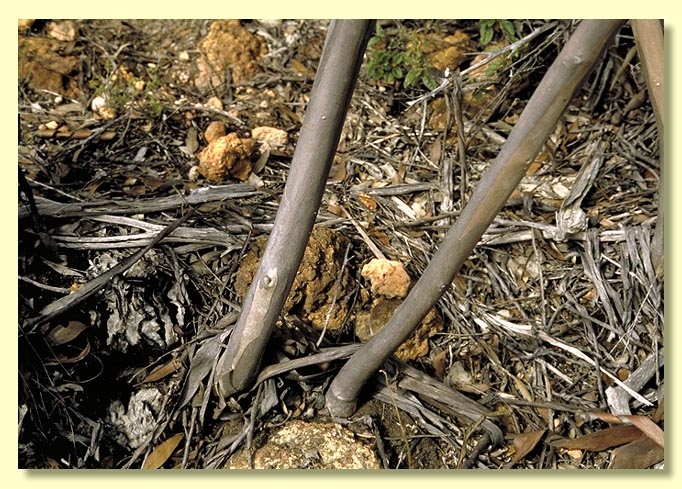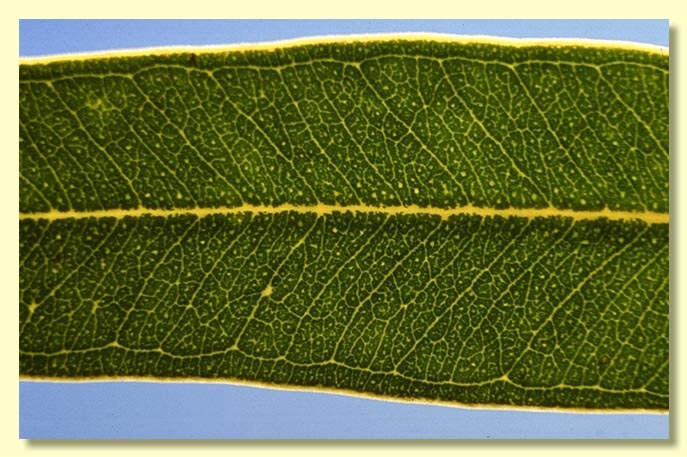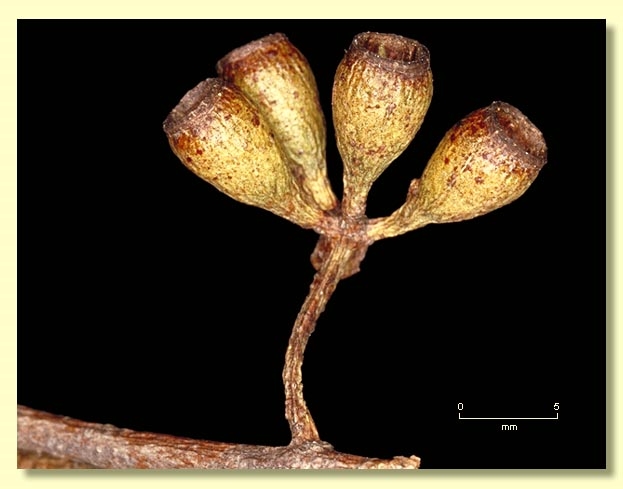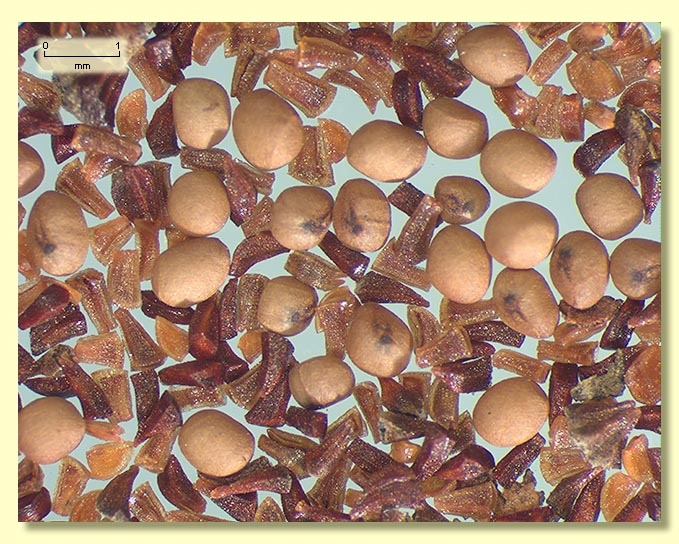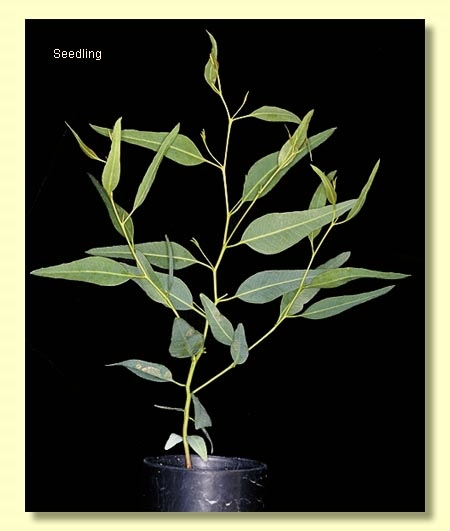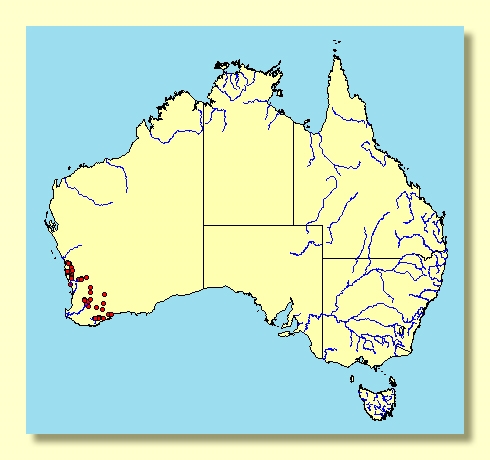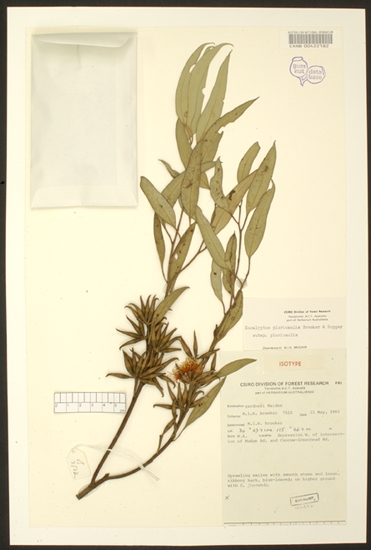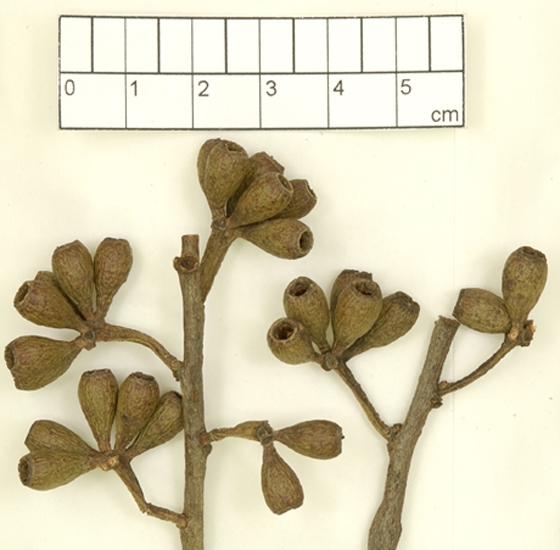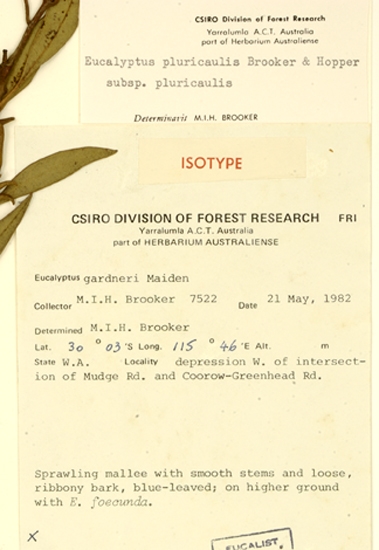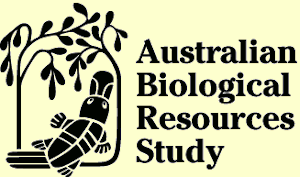Eucalyptus | Symphyomyrtus | Bisectae | Glandulosae | Levispermae | Levispermae
Euclid - Online edition
Eucalyptus pluricaulis subsp. pluricaulis
Bark smooth throughout, grey over cream then coppery, ribbons sometimes present.
Branchlets usually without pith glands, if any present then few.
Juvenile growth (coppice or field seedlings to 50 cm): not seen.
Adult leaves thickish, alternate, petioles 0.8–1.7 cm long; blade lanceolate, 5–10.5 cm long, 0.7–2 cm wide, base tapering to petiole, margin entire, apex pointed, concolorous, dull, blue-green, side-veins usually greater than 45° to midrib, rarely less, reticulation moderate to dense, intramarginal vein remote from margin, oil glands few or obscure.
Inflorescence axillary unbranched, peduncles widening apically, 0.8–1.7 cm long, buds 9 or 11, pedicellate to rarely sessile (pedicels 0–0.6 cm long). Mature buds long-fusiform (1.7–2.8 cm long, 0.3–0.5 cm wide), scar present, operculum horn-shaped, three to four times as long as hypanthium and equal to it in width at the join, few outer stamens erect, most stamens variably deflexed, anthers oblong, dorsifixed, dehiscing by longitudinal slits, style long and straight, stigma rounded to blunt, locules 3(4), the placentae each with 4 vertical rows of ovules. Flowers lemon or pale yellow.
Fruit pedicellate (pedicels 0.1–0.6 cm long), cylindrical to barrel-shaped, 0.7–1.1 cm long, 0.5–0.7 cm wide, disc descending vertically, valves 3(4), near rim level.
Seeds pale brown to straw-coloured, 0.5–1.3 mm long, cuboid to sub-spherical, surface smooth, hilum ventral/terminal.
Cultivated seedlings (measured at ca node 10): cotyledons Y-shaped (bisected); stems rounded in cross-section; leaves always petiolate, opposite for 3 to 5 nodes then alternate, lanceolate to ovate, 5–9.5 cm long, 1.5–3.5 cm wide, dull green.
Flowering has been recorded in March, April, May, June, July and August.
Eucalyptus pluricaulis is a mallee species endemic to Western Australia, widespread in the wheatbelt, from Mt Lesueur area north of Perth south to Wickepin and east to Ravensthorpe. The stems are smooth and the adult leaves dull, blue-green.
Eucalyptus pluricaulis is a somewhat anomalous species in Eucalyptus subgenus Symphyomyrtus section Bisectae subsection Glandulosae because whilst the cotyledons are bisected and the buds have an operculum scar, as do other species in this group, the branchlets usually lack the characteristic pith oil glands or have very few. Within this subsection E. pluricaulis is one of a group of species that form series Levispermae subseries Levispermae characterised by having smooth spherical seed, a peduncle that widens apically, buds that are narrowly fusiform with some stamens erect others variably deflexed, usually dull blue-grey to grey-green adult leaves, and few, if any, oil glands in the pith.
Eucalyptus pluricaulis can be separated from other species with similar fusiform bud shape and stamen arrangement by the dull bluish or purplish adult leaves, mallee habit, smooth bark and the pith glands being absent or very hard to find. In the extreme south-east of the geographic range of E. pluricaulis there may be some confusion with E. varia, but the latter has adult leaves that are much greener adult leaves, which are dull but mature slightly glossy inside the crown.
There are two subspecies:
E. pluricaulis subsp. pluricaulis
The widespread form with more erect habit, consistently blue-green leaves and relatively narrow-leaved crown.
E. pluricaulis subsp. porphyrea
Restricted to the Stirling Range-Jerramungup area. It is notable for the low, straggly habit, dense crown and conspicuously purple leaves, usually broader than in subsp. pluricaulis . Subsp. porphyrea is unknown in cultivation but would be a handsome low shrub with its purple leaves and lemon to pale yellow flowers.


